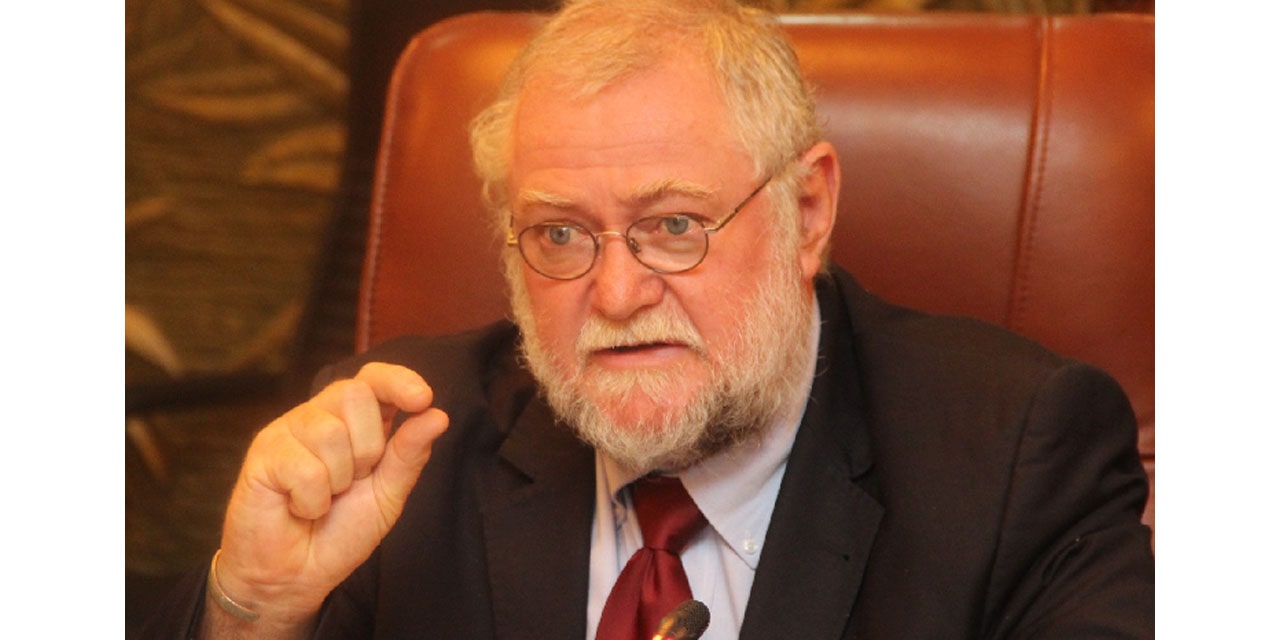Hertta-Maria Amutenja
The Minister of Agriculture, Water and Land Reform, Calle Schlettwein said that Groot Aub is experiencing two folds of water proplems.
Schlettwein said this in a speech read in his behalf, by the Executive Director Ndiyakupi Nghituwamata, during the commemoration of World Wetlands Day and World Water Day at Groot Aub, a settlement located approximately 60 kilometres south of Windhoek, in the Khomas Region of Namibia.
“Firstly, the water demand has exceeded water supply from the local water sources (groundwater), to such extend that drilled boreholes are unable to produce sufficient water. The demand for water has over the years increased due topopulation growth as more and more people settled in Groot Aub in search for housing. The increased population is linked to rural urban migration as our people move to urban areas in search for better opportunities. This upward trend of rural-urban migration requires creation of development opportunities in remote areas to create the much neededemployment tocurtail the rural-urban migration,” he said The agriculture ministry in partnership with the United Nations Educational Scientific and Cultural Organization (UNESCO), the City of Windhoek,Namibia Water Corporation,United Nations Development Programme (UNDP), Eduventure Namibia, Namibia University of Science and Technology (NUST) commemorated World Wetlands Day and World Water Day on Friday.
This year’s celebration was under the theme “it is time for wetlands restoration” and the World Water Day under the theme “accelerating changethrough partnerships and cooperation”. Celebrations were held at Groot Aub.
Furtheremore he said the available water sources are increasingly under pressure from pollution associated with human activities.
“As such we need to ensure that the already limited available water is kept free of contamination by employing measuresthat do not compromise the safeguard of our water. For this we need to designate areas that are suitable for animal keeping, manage waste including wastewater to ensure that effluents and other possible pollutants are not washed into the groundwater,” he added.
Schlettwein said the ministry decided to commemorate World Wetlands Day jointly with World Water Day because wetlands are a vital component of the freshwater cycle.
“As I said in the beginning, wetlands are the providers of freshwater, both in quantity and quality, so maintaining healthy freshwater wetlands means securing water supply. Their conservation and sustainable use must be an integral part of any solution to the freshwater crisis. Don’t let us forget about the many other resources and services provided by our freshwater wetlands that go well beyond freshwater supply, providing the basis for sustainable livelihoods in rural areas and thus a part of the solution to rural poverty. Our rural communities depend on wetlands for food such as fish and building materials,” he said.
In addition Schlettwein said the demand for water in the world and in Namibia has been increasing and will continue to do so over the coming decades due to population growth, socio-economic development, demand for food production and climate change.
“It is also observed that climate change is causing rising temperatures and increased rainfall variability on our continent of Africa. In many areas, surface water resources, which are particularly vulnerable to the effects of climate change and pollution, are declining and becoming increasingly unpredictable,” he stated.
The UN General Assembly adopted resolutions to designate 2 February as World Wetland Day in 1997, and 22 Marchas World Water Day in 1992.
World Wetlands Day is observed to coincide with the signing of the Ramsar Convention of wetlands of international importance.
This year’s commemoration calls for global solidarity and for each and every one of us to make commitments both at the personal and government level toward restoration and preservation of wetlands and water resources.
Futhermore he added the ministry should commit to intensifying collaboration among sectors so that it can sustainably ensure water supply to the locals and to safeguard the available resources.
“We therefore need to encourage the Young Water Professionals to develop interests in research particularly in water related fields to determine theresources potential and sustainable development. Informed management requires improved knowledge base, institutional capacity and enhanced governance to unlock sustainable development of groundwater resources for socio-economic development, water and food security, and climate change resilience, “said Schlettwein.
Moreover, Alka Bhatia, UNDP Resident Representative to Namibia plead with all stakeholders to renew their commitment to conserve and manage the country’s water resources.
“We need to sustain this effort with innovations, especially for climate change adaptation. We should equally renew our commitment to protecting and restoring these critical ecosystems and promote sustainable land use practices. Reduce pollution and mitigate the impacts of climate change to safeguard our wetlands for future generations,” said Bhatia.




